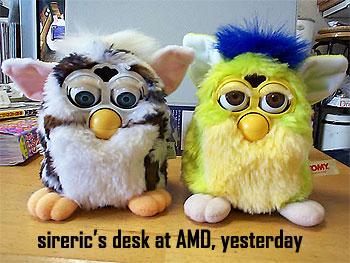One thing R6xx clearly excels at is FP16 blending and filtering. While the former makes a lot of sense for the variety of titles using HDR today, the latter is a much more debatable design choice, and especially so in light of your competitor's architecture. Are you envisioning developers to use many FP16 and RGBE textures in the future? Wouldn't you hit memory footprint limitations then anyway, compared to 4bpp/8bpp compressed texture formats?
With 512MB and 1GB boards out there, memory footprint issues must be considered, but are generally secondary to the performance of the functional units. I remember when we decided to focus on FP16 as “the basic†unit for most things on the R600. At the time, HDR rendering was just starting, but it certainly seemed the way of the future. Not only for floating point “image†textures, but also for all types of floating point textures, such as normal maps and other more complex floating point data sets. In retrospect, the industry is probably moving a little slower than we expected, though I would say that games like Oblivion in 2006, and a few of the upcoming titles are really changing the tides, at least at the avant-garde of games. I'd like to think that our chips are very forward looking.
In previous generations, your hardware was known to be slower in stencil-oriented workloads, but R600 seems to have improved dramatically in that area. Is there anything you can say on the technical details of the new implementation? Hier-S has been mentioned, so how does that work, and is there more to the improvements than that?
The top 2 things that come to mind are a separate stencil buffer (from Z) and hierarchical Stencil. The first one prevents Z decompression from occurring as the stencil buffer gets used and updated. This was a prime cause of slowdowns on Doom3 for the R5xx, for example. That's gone now. As well, HiS, just like HiZ in the past, allows for skipping whole tiles of pixels when appropriate. This has lead to some significant clock-for-clock improvements on stencil heavy operations, compared to previous generations. In game improvements of 30% or even up to 100% have been seen, for stencil shadow heavy games.
What process variants are RV6xx produced on? We know that R600 is on 80HS; are RV6xx on 65G+ or 65LP, or perhaps even another variant? How does that affect various aspects such as power requirements and clock speeds? Is it identical for desktop and laptop parts, does it even have to be?
All the derivatives announced are TSMC 65G+ process chips. I won't comment on future chips, but we are continuously re-evaluating processes, and we work a lot with our manufacturing friends, such as TSMC, to get the very best process we can.
Lastly, as you look around the web at reaction to the R6 family. . .are there any specific aspects to the design that you feel have been particularly misunderstood or not emphasised to the degree they deserve?
I can't help but be a little disappointed that we did not have enough time to get more optimizations into our drivers in time for the launch. I still cringe when I see poor performance (especially if it's compared, to, say, our previous generation products), and send daily emails to the performance and driver team, begging for this or that. In fact, I do believe that they all hate me now. They should join the club.
Also, on the feature side, we weren't able to expose the adaptive edge detect CFAA modes to the public, or even to the press, until very late in the review process. This means that most reviewers did not have a chance to look at the amazing quality this mode offers – There is nothing comparable to it out there.
We also had some last minute performance possibilities, which is always incompatible with stability, and we did not have enough time to get those tested and integrated in time for launch. We see in the latest driver, some 2x to 3x improvement in adaptive AA performance, for example, which is great but came later than I would have liked. But, I'll admit, there's so much to do still, that I haven't really spent that much time on reviews and such. The reality is that I expect things to continue to improve and be much better in a few months.

